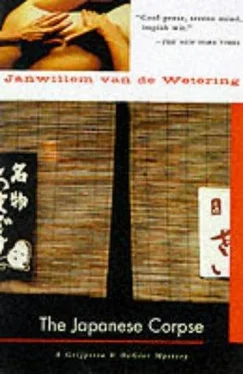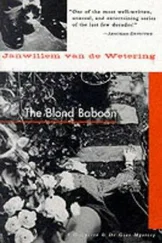Janwillem De Wetering - The Japanese Corpse
Здесь есть возможность читать онлайн «Janwillem De Wetering - The Japanese Corpse» весь текст электронной книги совершенно бесплатно (целиком полную версию без сокращений). В некоторых случаях можно слушать аудио, скачать через торрент в формате fb2 и присутствует краткое содержание. Жанр: Полицейский детектив, на английском языке. Описание произведения, (предисловие) а так же отзывы посетителей доступны на портале библиотеки ЛибКат.
- Название:The Japanese Corpse
- Автор:
- Жанр:
- Год:неизвестен
- ISBN:нет данных
- Рейтинг книги:3 / 5. Голосов: 1
-
Избранное:Добавить в избранное
- Отзывы:
-
Ваша оценка:
- 60
- 1
- 2
- 3
- 4
- 5
The Japanese Corpse: краткое содержание, описание и аннотация
Предлагаем к чтению аннотацию, описание, краткое содержание или предисловие (зависит от того, что написал сам автор книги «The Japanese Corpse»). Если вы не нашли необходимую информацию о книге — напишите в комментариях, мы постараемся отыскать её.
The Japanese Corpse — читать онлайн бесплатно полную книгу (весь текст) целиком
Ниже представлен текст книги, разбитый по страницам. Система сохранения места последней прочитанной страницы, позволяет с удобством читать онлайн бесплатно книгу «The Japanese Corpse», без необходимости каждый раз заново искать на чём Вы остановились. Поставьте закладку, и сможете в любой момент перейти на страницу, на которой закончили чтение.
Интервал:
Закладка:
"I took it from the restaurant window," the girl said. "They didn't know. They had come for lunch and had drunk too much beer."
The photograph was in color and the men had red faces. They were smiling happily. They were both fairly fat and were dressed in dark suits, the double-breasted jackets spanning their bellies. The hair of the one man was cut short, the other was bald. "Shopkeepers," Grijpstra thought. "Minor officials," de Gier thought. "They look secure, nobody can fire them." "They could be policemen," the commissaris thought, "but they are certainly not detectives for they have no brains. Strongmen. Gangsters, yes, why not?"
"The yakusa are gangsters, miss?" the commissaris asked.
"They are like gangsters," the girl said. "I went back to America once, on a holiday, and I met some gangsters, but the Americans are different from the Japanese."
"In what way are they different?"
"In America the gangsters compete. They fight each other. They wouldn't do that in Japan. And in America the gangsters specialize in crime; the yakusa are in everything. They are in art too; they will sponsor art shows, they will build sports halls, they will even support the government and the police. It's possible to be a religious man and a yakusa. If Japan has a heaven there will be yakusa in it. The doorman will be a yakusa." She tried to smile.
The commissaris looked up from the photograph. "How old are you, miss?"
"I was born in 1946."
"A gangster guarding the gate of heaven," the commissaris said softly. De Gier laughed and the commissaris turned his head. "You think a gangster will guard the gate of heaven, de Gier?"
"Yes, sir," de Gier said, and straightened up. He was holding an imagined Tommy gun and his strong curved nose pointed straight ahead. "One on each side of the great gate. Gangsters are dedicated men, reliable, obedient. They have their uses."
"Well," the commissaris said. "I don't know. You have read more about them than I have, I think. We don't really have any gangsters in Holland. It's an interesting thought."
Grijpstra had become restless. He was clearing his throat and moving about the desk.
"Yes, Grijpstra?"
Grijpstra looked relieved. "With this photograph the job should be easy, sir."
"If they are still in the country," the commissaris said, and pressed a buzzer. A constable came in and was given the snapshot and told to take it to the photographers' room for multiplication.
"Yes," the commissaris said. "We'll know soon what hotel they stayed in, and what names they gave. They may have used false passports. If we don't catch them here the Japanese police can catch them. We'll have to make contact with their ambassador in The Hague through the Ministry of Foreign Affairs. It's all routine. Tell me, miss, why did these men associate with Mr. Nagai?"
The girl was trying to light a cigarette but her hand wasn't steady. De Gier struck a match for her from a box on the commissaris' desk.
"I can give you some information," the girl said, "but I would like to go on living. I have my mother to support and my sister's son is in college; I send him money every month. If I stay here I won't live long. I shouldn't have taken that photograph, the yakusa will not like it, and they usually do something nasty when they are displeased. I will have to be careful."
"You have an American passport?"
The girl nodded.
"What would you like to do?"
"I would like to go to America, but first I would like to hide somewhere, for a few weeks, while I think of what I want to do. If I go to America nobody must know where I am. I'll have to think of the right place. I may have to change my name."
"A cover," the commissaris said. "I am sure it can be arranged. We are friendly with the American embassy and they have a room somewhere with a CIA man in it. I know the man. He can do things very quickly. We are not so quick, but you are an American, and it will be easy for him to help you."
"Can I stay somewhere for a few weeks?"
"I have a niece in the country," the commissaris said. "She has lived in the Far East and she is lonely. You could remind her of more fortunate times. Shall I phone her?"
The commissaris phoned; the conversation didn't take long.
"You are welcome," he said, "today if you like. De Gier can drive you to a railway station and make sure nobody follows you. We'll do it properly."
He looked at the girl and smiled. "Some coffee perhaps?"
"Please."
De Gier poured the coffee, and the three men and the girl busied themselves with the sugar bowl and the cream pitcher.
"Yes," Miss Andrews said. "I will tell you. I think I can trust you." She looked at the commissaris over her cup. He inclined his head and his long yellowish teeth showed in a hesitant smile. The commissaris looked neat. His thin hair was meticulously combed into two exact halves and the knot of his narrow tie was perfect. A thin golden chain decorated his waistcoat.
"The CIA?" the girl asked. "A new passport with a new name for me, and a one-way ticket to New York via Paris or Rome?"
"Yes," the commissaris said. "The CIA owes us some favors. It'll only be a small thing to them."
"I am yakusa myself," the girl said. "I was from the moment I started work in the Kobe nightclub. The club had many foreign clients. U.S. officers and businessmen from Western Europe and Chinese from Hong Kong and Taiwan. The yakusa wanted to know what was going on. They made contact through us, the barmaids and hostesses. If we found something worthwhile we would tell the barman and he would tell the manager. Then somebody would come down from the hills where the daimyo has his court."
"Daimyo?"
"The word means nobleman. Japan was run by daimyos once but then they had titles like count or duke. The titles have gone but the daimyos go on ruling. They rule the big companies, and they rule the yakusa. And they are stronger than the rulers of old for the title doesn't pass from father to son. Now the new daimyos have to prove themselves."
"Right," the commissaris said. "Go on, miss."
"My boyfriend, Kikuji Nagai, was also yakusa. He got into it because he wanted to go to college. He passed the entrance examination without help, a very unusual thing to do, for entrance examinations in Japan are like fire-tests; you have to walk barefoot on glowing stones. You have to study day and night. You have to know answers to thousands and thousands of unrelated questions. It's a true hell. We have a name for it. Shiken Jigoku. Examination hell. Kikuji passed but he still couldn't get into the university. Only a few students are admitted, important students, sons of important men. Kikuji's father wasn't important."
"I thought Japan was a democracy," the commissaris said.
"It's called a democracy," the girl said, "but no Japanese knows the meaning of the word. They have rules, and the rules are thousands of years old. The names of the rules are changed but not the rules. Now the rules are called democratic."
"So?" the commissaris asked.
"So Kikuji went to the yakusa. It was an unusual thing to do, for the yakusa are never approached directly. But Kikuji was born after the war. He didn't really believe the old rules and he often worked out his own answers. He went to the hills behind Kobe and found the daimyo's castle and said to the guards he wanted to see the daimyo himself, and he wouldn't tell them why. They told him to go away and he sat on the ground. They threatened to beat him up and he bowed. He upset them. They spoke to their boss and the boss spoke to his boss and finally somebody mentioned the matter to the daimyo. Kikuji had been sitting on the ground for ten hours. He had wet his pants and he was so stiff that they carried him in and told him to take a bath and gave him some clothes."
Читать дальшеИнтервал:
Закладка:
Похожие книги на «The Japanese Corpse»
Представляем Вашему вниманию похожие книги на «The Japanese Corpse» списком для выбора. Мы отобрали схожую по названию и смыслу литературу в надежде предоставить читателям больше вариантов отыскать новые, интересные, ещё непрочитанные произведения.
Обсуждение, отзывы о книге «The Japanese Corpse» и просто собственные мнения читателей. Оставьте ваши комментарии, напишите, что Вы думаете о произведении, его смысле или главных героях. Укажите что конкретно понравилось, а что нет, и почему Вы так считаете.












